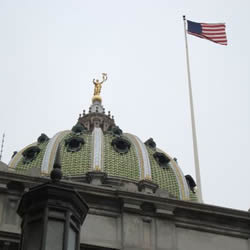Legislation introduced this week in the state of Pennsylvania seeks to regulate online poker in addition to traditional table casino games. House Bill 1235, as the new bill is called, was put forward by Pennsylvania State Representative Tina Davis (D-Bucks County), a member of the state’s Gaming Oversight Committee, to which the bill was sent for consideration after its introduction.
Pennsylvania is not the only state considering regulation of Internet-based gaming. This story is playing out across the country for a couple of reasons: the absence of federal regulation of online poker or any other form of online gambling, competition, both online and off, from neighboring states, and a desperate need on the part of many state governments to “discover” new forms of revenue as the economy continues to limp toward recovery.
Pennsylvania joins Illinois and California (and a handful of other states) in looking at creating laws to regulate online betting. So far, none of the three states that have passed laws allowing for Internet-based wagering – New Jersey, Nevada, and Delaware – have populations large enough to support a robust gambling market. Should we start to see more populous states enter the regulated market, a more stable online gambling market should begin to take form in the United States.
Under the terms of HB 1235, the text of which can be found here, companies currently holding slots licenses in the state of Pennsylvania would be welcome to apply for Internet gambling operating licenses, the cost of which has been adjusted down to $5 million from a previously-set price of $16.7 million. Each license would expire after three years, and is renewable for a fee of $500,000.
In a memo released in January of this year, Representative Davis stressed the need not only to grow the gambling industry in her state, but to protect the existing casino businesses present in the state, which is the second-largest gambling market in the US behind Las Vegas. Presently there are eleven land-based casinos in the state, with more planned, including another license to be granted for the Philadelphia metropolitan area. One of the contenders for that license is Steve Wynn, who wants to build one of his signature luxury resorts in the city.
Davis wrote in the memo that “it is imperative that we maintain the integrity of our gaming industry amid inevitable federal preemption and competing states, as well as possible expansion of internet games through the privatization of our own State Lottery.”
“A responsible internet gaming system must be created in order to protect Pennsylvanians and the success of the established gaming industry in the Commonwealth, which has generated more than $7 billion in state tax revenue, and created more than 16,000 jobs statewide,” the memo went on.
HB 1235 will provide for interstate poker compacts, providing no state or federal laws are violated. Nevada passed a law earlier this year that will allow for that state’s governor, Brian Sandoval, who once served as chairman of the Nevada Gaming Commission, to negotiate similar deals with other states that have also regulated online poker.

